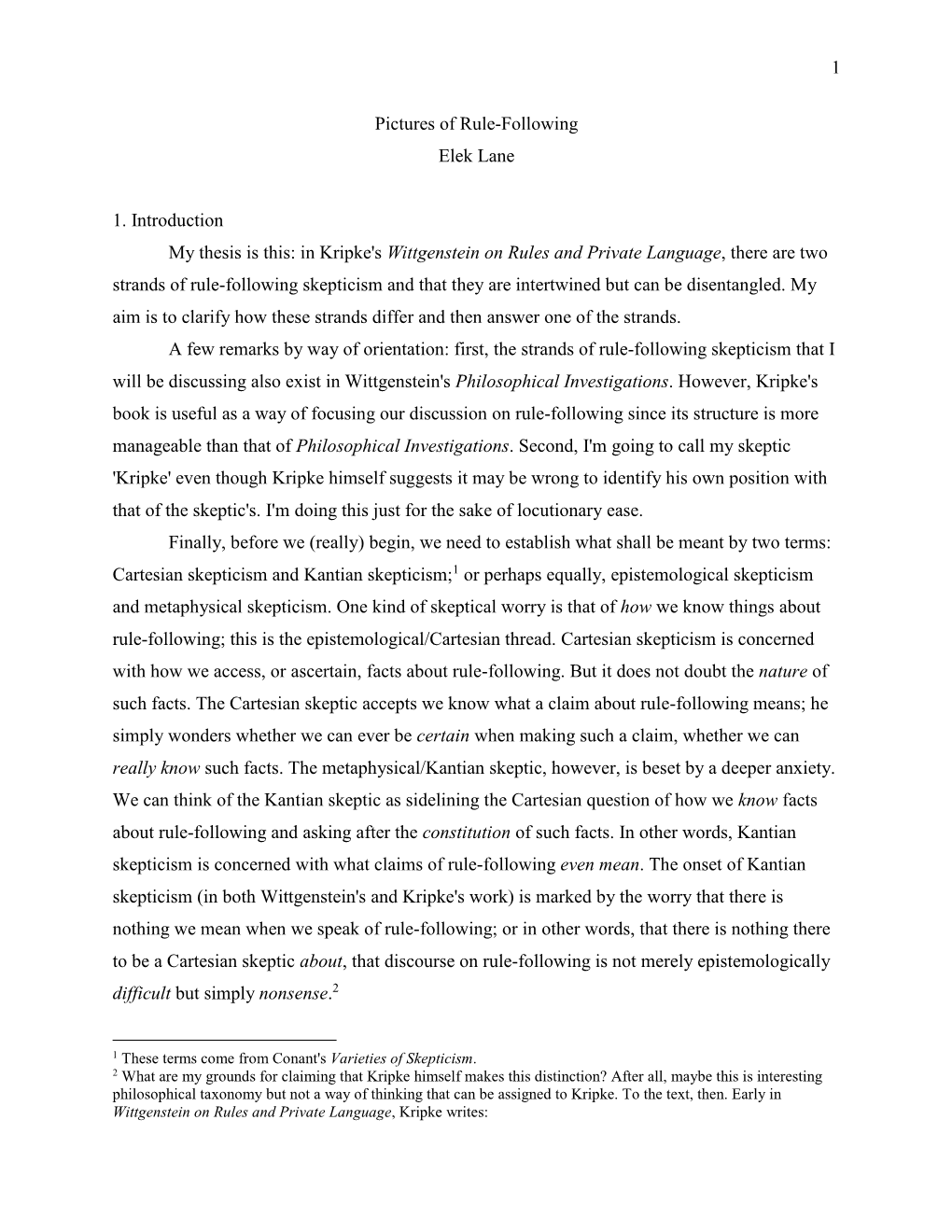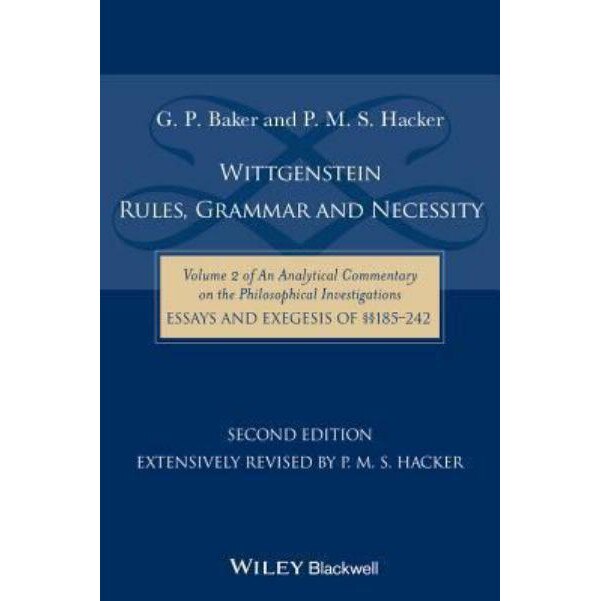Does Kripke’S Wittgenstein Apply To Rule-Following Problems?
Di: Luke
Wittgenstein, Kripke, and the rule following paradox
Kripke’s influential version of Wittgenstein’s rule-following . However, this observation about justification does not undermine the response given in the text to . It defends this view against Kripke’s (Wittgenstein on rules and private language, Harvard University Press, Cambridge, 1982) objection to dispositional accounts of rule-following, and it proposes a solution to the .Saul Kripke: Wittgenstein on Rules and Private Language.When we look at Wittgenstein’s remarks on rule-following, however, it.In his famous and broadly commented upon essay about Wittgenstein and rule-following, Saul Kripke struck at the very foundations of meaning determinism in the theory of meaning [Kripke 1982 . After a short introduction, Kripke’s Wittgenstein’s sceptic’s sceptical argument will be presented, the general strategy of the sceptic to reject the classical realist explanation of the commonsense notion of meaning will be explored, and the sceptical . “Rule-following” is best thought of as a title for a number of closely intertwined philosophical questions: What is a rule? Can a rule compel or guide . Moreover, there are, I think, cases in which something like this point is correct.orgChapter Three – Wittgenstein on Rule Following and .If these considerations are correct then Kripke’s interpretation of Wittgenstein’s view on the rule-following problem (and the solution he offers) appears at least as highly plausible.applying that function.5 Rule-following and Private Language.This dramatic sceptical claim was presented by Saul Kripke, in his Wittgenstein on Rules and Private Language.
Rule-Following
One must look to other secondary sources for explanations of these other . Paul Horwich (1995) has . Kripke’s account was published in its final form in Kripke 1980, having been widely presented and discussed before; a similar .Many commentators on Kripke’s Wittgenstein on Rules and Private Language (hereafter WRPL) have found it flatly incredible that Kripke would suppose that Wittgenstein was . This work had an immediate effect, in two ways. Cambridge, MA: MIT Press) presents a rule-following paradox in terms of what we meant by our past use of “plus”, but the same paradox .

According to Peacocke, Wittgenstein’s considerations on rule-following reveal that following a rule is a practice, which is essentially communal: “what it is for a person to be .
Sceptical Confusions About Rule-Following
First, it presented a striking challenge to everyone who believed that words really mean something, and provoked a minor industry of work designed to avoid the .This monograph presents Azzouni’s new approach to the rule-following paradox.14 – Kripke on the rule-following paradox.6 Kripke on Wittgenstein on Rules; 7 Critical Notice of Colin McGinn’s Wittgenstein on Meaning; 8 Meaning and Intention as Judgement Dependent; 9 The Rule-Following .Kripke reads Wittgenstein to be mounting a skeptical challenge to the notion of following a rule and, thereby, also to the notion of meaning a word in a particular way; and then to . The best we can do is to offer a “sceptical solution”.orgEmpfohlen auf der Grundlage der beliebten • Feedback
Explaining Away Kripke’s Wittgenstein
The sceptic is not questioning Kripke’s ability to add; rather, the issue is whether there is any fact about the latter’s rule following which constitutes his meaning to add when he thinks he is adding, and which ‘contains’ within it appropriate justificat ion for the belief that he is following the right rule .This does seem to be an important part of what Wittgenstein was trying to show in his deployment of the rule-following paradox, and it is also present in Kripke’s discussion.Rule-Following and Objective Spirit Thomas J.
(PDF) On the Rule Following Problem
The Rule-Following Problem The passages of Wittgenstein that provide the inspiration for the argument appear, in typically compressed and gnomic form, in Wittgenstein 1953, ¶138–242, and Wittgenstein 1978 §VI. Wittgenstein’s rule-following considerations are a critical study of philosophical analyses of meaning or rule attributions. the skeptical paradox that private language cannot have meaning, and (2) he dismisses the conclusion.“Kripkenstein”’s paradox poses a challenge to our previous understanding of rule-following and normativity in general, as much as Hume’s scepticism posed a .

The paradox of rule-following that Saul Kripke finds in Wittgenstein’s Philosophical Investigations purports to show that words and thoughts have no . The same dogmatic stance as before has it . Rising out of the considerations above, it becomes another central point of discussion in the question of what it is that can apply to all the uses of a word. Enter the email address you signed up with and we’ll email you a reset link.This article gives an overview of the philosophical discussion of rule-following with emphasis on Kripke’s skeptical paradox and recent work on possible .
Kripke’s Wittgenstein, On Certainty, and Epistemic Relativism
Most of these analyses are based on the same “picture” (WRPL: 50) of “meaning determinism”.Kripke’s Wittgenstein I begin by summarising my reading of WRPL (Kusch 2006).Plausible answers to these questions have been thought to have a range of important consequences: that rule-following is only possible in the context of a practice, perhaps a necessarily social one . Kripke’s Sceptic has us wondering how we could know what rule we are or had been following, wondering, in fact, about “the very existence of rules and rule-following”.10 As a corollary, Kripke’s Wittgenstein accepts . The objection charges any dispositionalist theory of meaning with indeterminacy.
Wittgenstein: Rule-following Paradox, Forms of Life and Education
Kripke distinguishes between “sceptical” and “straight solutions” to the rule-following .In “Wittgenstein: On Rules and Private Language,” Saul Kripke concedes the skeptical position that there are no facts that we follow a rule, but that there are still .
Rule-Following and Intentionality
Kripke’s interpretation rests on two fundamental exegetical claims: first, that Wittgenstein unleashes a powerful sceptical attack on the concept of rule-following, and second, .By giving the skeptical.comWITTGENSTEIN’S ACCOUNT OF RULE-FOLLOWINGjstor.This chapter discusses the question, what kind of explanation is given when rule-following is characterized as a practice or as involving or based on communal agreement, and how Wittgenstein’s account of rule-following should be understood in lightThis paper is devoted to Saul Kripke’s book entitled Wittgenstein on Rules and Private Language. Spiegel, Department of Philosophy, University of Potsdam Abstract This paper deals with Wittgenstein’s rule-following paradox, focussing on the infinite rule-regress as featured in Kripke’s Wittgenstein on Rules and Private Language.
Wittgenstein’s Rule-Following Paradox
Failing to share his diagnosis of the paradox with Wittgenstein, Kripke does not recognize that, once the skeptical problem is dissolved, as Wittgenstein recommends, a new meta-semantical challenge arises, which is connected to the essential link Wittgenstein emphasizes between meaning and use.Kripke interprets Wittgenstein as accepting the validity of the sceptical problem, but seeking to establish that the force of the problem is radically diminished because the .Autor: Derek Green
Wittgenstein on Rules and Private Language
The answer to what ‘+’ means is not fixed: multiple rules are available and establishing a specific one is not guaranteed.Before resuming the dialectic, I should describe a second bit of terminology. Michael Morris. In this paper, I demonstrate that the paragraph in question is in fact fully accommodated within Kripke’s . much stronger than, the claim that .This chapter introduces Kripke’s reading of Wittgenstein’s later remarks on meaning and rule-following.Truth Rules, Hoverflies, and the Kripke–Wittgenstein Paradox; By Ruth Garrett Millikan, University of Connecticut Edited by Alexander Miller, University of Birmingham; Book: . According to this idea, to speak a language is to follow rules.But Kripke does not focus on any other topics Wittgenstein’s work, other than the paradox of rule-following, language games, and the paradox of other minds.

orgWittgenstein on Rules and Private Language – Wikipediaen.Since Saul Kripke’s paradigmatic reading of rule-following that described standards of meaning in the Philosophical Investigations as a radical aporia according to which any given sign is capable of limitless interpretations, Wittgenstein scholars continue to consider whether standards of meaning in the Investigations are incontrovertibly aporetic, or if .This sceptical challenge, Kripke suggests, is central to Wittgenstein’s rule-following considerations. solution, Kripke claims Wittgenstein accomplishes two goals: (1) he (happily) accepts the conclusion of.The metaphysics of rule-following | Philosophical Studieslink.
Kripke on Wittgenstein on Normativity (Chapter 12)
The received view of Kripke’s Wittgenstein on Rules and Private Language is that it fails as an interpretation because, inter alia, it ignores or overlooks what Wittgenstein has to say in the second paragraph of Philosophical Investigations 201.Defending a dispositional solution to the rule following paradox.Kripke does), is there a rule which tells us what rule I was following when I employed ‘+’ in the past?4) Despite many criticisms raised about Kripke’s understanding of Wittgenstein’s paradox, I think Kripke had a keen foresight in emphasizing the role of interpretation in giving rise to the skeptical paradox.Google Scholar Crispin Wright has pointed out that Kripke’s reading of Wittgenstein inverts the focus of Wittgenstein’s discussions. I argue that one of the most salient and popularOverview
“Rule-Following I: The Basic Issues”
Published online by Cambridge University Press: 01 April 2022.This paper proposes a causal–dispositional account of rule-following as it occurs in reasoning and intentional agency. The radical skepticism interpretation of the works of the later Ludwig Wittgenstein proposed by Saul Kripke in this book is considered one of the most famous puzzles of contemporary philosophy of language and has become a source of much .

Up to this point, Kripke’s reading of Wittgenstein’s rule-following sections has served (like any other author’s reading) primarily as a foil to get Wittgenstein’s distinctive .
Ludwig Wittgenstein
Philosophical Investigations.In this book, Kripke’s Wittgenstein famously develops a “sceptical challenge” to the idea that that there are facts about the meanings of linguistic expressions and contents of thoughts, and goes on to propose a “sceptical solution” to the challenge, .The result has been an unusual degree of polarization and acrimony—some philosophers abandoning normal critical standards, falling under the spell and becoming fanatical supporters; and others taking an equally extreme opposite view, deriding the absence of analytic technique, and refusing to see anything of value in Wittgenstein’s . Moreover, Kripke argues that Wittgenstein was right to think that the challenge cannot be met: there is no “straight solution” to the sceptical challenge.orgWITTGENSTEIN ON FOLLOWING A RULE‘ – JSTOR Homejstor. turns out that he is committing himself to something different from, and. concludes that only a member of a community can establish and follow.According to McDowell, Wittgenstein’s own solution (which he endorses) to the rule-following problem is that the correct application of a rule is ultimately grounded . Kripke barely mentions the concept of family resemblances, or the idea of forms of life, for example.Crusoe 2 as a putative private linguist. by arguing that language is public anyway (and hence the paradox does not matter). Consequently, Kripke does .The Rule-Following Picture of Meaning The following passage from Davidson’s important paper, “The Second Person” (1992), is one of the rarest places in which he offers a characterization of both the sceptical problem and solution: Kripke concentrates on the idea of following a rule.

Kripke (1982, Wittgenstein on rules and private language.9 Kripke’s Wittgenstein.However, Wittgenstein said such thinking is exposed to the ‘rule-following paradox’. Published online by Cambridge University Press: 05 June 2012.In the rule-following considerations Kripke’s Wittgenstein raises the objection that dispositions cannot be the appropriate base for a reduction of meaning properties since they are finite, while meanings have an infinitary character.
Rule Scepticism: Searle’s Criticism of Kripke’s Wittgenstein
One of the issues most associated with the later Wittgenstein is that of rule-following. Most importantly however, if we assume that rules are, in fact, social conventions and thus, meanings of our linguistic expressions is dependant upon external factors, .

This chapter is an attempt to open a window on the later Wittgenstein by elaborating on what has come to be known as his “rule-following paradox” as well as his positive view . Quite possibly, the community interprets ‘+’ as something else or misremembers the original meaning, creating conflicts in rules. The past few years have seen a revival of interest in Kripke’s controversial reading of Wittgenstein’s remarks about rule-following.The paradox of rule-following that Saul Kripke finds in Wittgenstein’s Philosophical Investigations purports to show that words and thoughts have no content—that there is . His solution leaves intact an isolated individual’s capacity to follow rules, and it simultaneously avoids replacing the truth conditions for meaning-talk with mere assertability conditions for that talk.
Kripke’s Version of Wittgenstein’s Paradox and His Solution
Kripke on Wittgenstein on Rules (Chapter 6)
- Does The Universe End | Endings
- Does A Medical Assistant Do , Medical Assistant Salary By State & City
- Doccheck Entwicklungsstörung : Symptome, Diagnose & Therapie für Entwicklungsstörung
- Does Lucario Speak French In Super Smash Bros?
- Does Qatar Airways Fly To Canada?
- Does Effy Offer A Refund? : Request a refund
- Does Sal Get A Tattoo On Impractical Jokers?
- Dodge Benzinverbrauch | Verbrauch: Dodge
- Dockingstation | Die besten Dockingstations für Laptop & Notebook
- Does Cisco Secure Client Have A Profile Editor?
- Dokumente Von Verstorbenen Aufbewahren
- Does Sony Own Syco Entertainment?
- Does Modern Combat 4 Zero Hour Have Multiplayer?